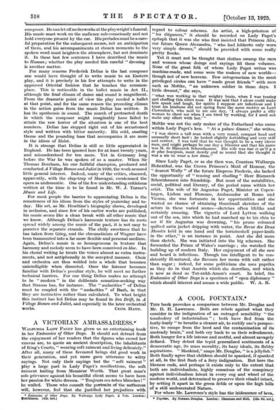A VICTORIAN AMBASSADRESS.*
WALDURGA LADY FACET has given us an entertaining book in her Embassies of Other Days. It should not detract from the enjoyment of her readers that the figures who crowd her canvas are, to quote an ancient description, the inhabitants of King's Courts, "wearing soft raiment and living delicately." After all, many of these favoured beings did good work in their generation, and yet more gave utterance to witty sayings. Not only their sayings but the "soft raiment" play a large part in Lady Paget's recollections, the soft raiment hailing from Monsieur Worth. That great man's sole grievance against his beautiful client seems to have been her passion for white dresses. " Toujours ces robes blanches!" he wailed. Those who consult the portraits of the authoress will, however, feel that she justified her prejudices with • Embassies of Other Dap. By Walburga Lady Paget. 2 Vols. London: Mitchinson. tab. -net.]
regard to colour schemes. An artist, a high-priestess of "lea elegances," it should be recorded on Lady Paget's epitaph that it was she who first -insisted that Princess Alix, our future Queen Alexandra, "who had hitherto only worn
very simple dresses," should be provided -with some really pretty frocks.
Yet it must not be thought that clothes swamp the men and women whose doings and sayings fill these volumes. None of -the great folk of whom Lady Paget writes was machine-made, and some were the makers of new -worlds— though not of new heavens. Few octogenarians in the most privileged circles can have "made great friends" with men such as Moltke, "an unknown soldier in those days. I little dreamt," she says, "what was working in that weighty brain, when I -was teasing and chaffing this silent man. It was said that I alone could make him speak and laugh, for spirits I suppose are infectious and I trust his kindness did not spring from the same motive as Lord Clarendon's, who said to me one day, 'I always prefer a silly woman to cheer me when I am tired by working, for I need not make any effort with her.'" Moltke was not the only maker of the Fatherland who came within Lady Paget's ken. "At a palace dinner," She writes, " I was shewn a tall man with a very round, compact head and unusually short hair : he looked slightly forbidding and very stiff and correct. I was told that he was thought to be a very clever man, and might perhaps be one day a Minister and that his name was M. de Bismarck Schoenhausen. His wife was tout cc qu'il y a de plus -bourgeois, most dowdy and so moral that she thought it was a sin to wear a low dress."
Since Lady Paget, or as she then was, Countess Walburga Hohenthal, was the Crown Princess's Maid of Honour, the "dearest Wally" of the future Empress Frederic, she lacked the opportunity of "teasing and chaffing" Herr Bismarck Schoenhausen into friendship. But most of the notabilities, social, political and literary, of the period came within her orbit. The wife of Sir Augustus Paget, Minister at Copen- hagen, Lisbon and Florence, Ambassador at Rome and Vienna, she was fortunate in her opportunities and she wasted no chance of obtaining thumbnail sketches of the actors in these varied scenes—sketches often lifelike and certainly amusing. The vignette of Lord Lytton walking out of the sea, into which he had marched up to his chin to see if Sir Augustus was drowning, "his prune coloured quilted satin jacket dripping with water, the Revue des Dews Mondes held in one hand and the tortoiseshell paper-knife in the other," is an instance in point. And she did more than sketch. She was initiated into the big schemes. She forwarded the Prince of Wales's marriage ; she watched the building up of modern Italy. Her enjoyment of all she saw and heard is infectious. Though too intelligent to be con- sistently ill-natured, she flavours her menu with salt rather than sugar ; indeed, for some politicians she uses paprika as they do in that Austria which she describes, and which is now as dead as Tut-ankh-Amen's court. In brief, the Embassies of Other Days is a specimen of "open diplomacy" which should interest and amuse a wide public. W. A. B.


























































 Previous page
Previous page